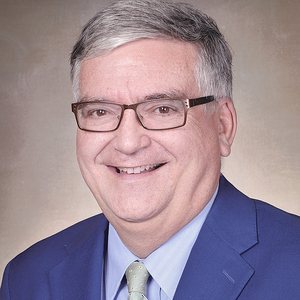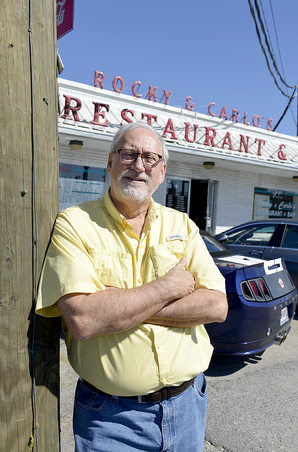
A platform that encourages healthy conversation, spiritual support, growth and fellowship

NOLACatholic Parenting Podcast
A natural progression of our weekly column in the Clarion Herald and blog

The best in Catholic news and inspiration - wherever you are!
'The Pharmacist': Coalition needed to balance big Pharma
-

 When Dan Schneider unveiled his missionary’s zeal to the world in February 2020 – just before the pandemic hit – the man now known across the globe as “The Pharmacist” by 100 million Netflix viewers became the embodiment of St. Bernard Parish resolve.
When Dan Schneider unveiled his missionary’s zeal to the world in February 2020 – just before the pandemic hit – the man now known across the globe as “The Pharmacist” by 100 million Netflix viewers became the embodiment of St. Bernard Parish resolve.Schneider’s son, Danny, had been murdered in 1999 in a drug deal gone bad in New Orleans’ Lower 9th Ward, fueling Schneider’s transition from the role of St. Bernard pharmacist to that of citizen detective.
While homicide detectives, understandably overwhelmed and perhaps disinterested, turned the page to the next faceless murder, Schneider carried on in his relentless quest to track down his son’s killer, a multiyear crusade that even some of his closest friends considered quixotic.
Schneider not only found his son’s killer, but his gumshoe work also exposed a New Orleans East opioid mill that fueled countless other deaths of kids about the age of his son.
Sitting with a video camera in his car at 2 a.m. one morning, Schneider watched as people in cars and taxis double-parked in front of the equivalent of a drive-thru, OxyContin candy store. Schneider saw people jumping out of their cars and running inside the building, where they forked over cash and returned a few minutes later with pre-written prescriptions.
Schneider’s relentless pursuit eventually shut down the pill mill and brought criminal charges against the doctor.
Hitting the Netflix lottery – his documentary, “The Pharmacist,” is one of the most successful videos in the service’s history – has given Schneider the standing to speak out forcefully against the drug scourge that has affected all segments of society.
“My platform is a lot bigger now,” Schneider said Aug. 24 at a town hall meeting at St. Philip Neri Parish on rising to meet the challenge of the drug crisis. “What I have found is that it opens doors. I get a chance to be heard, and it carries a little bit of weight.”
As a pharmacist, Schneider understands chemical reactions. As a person trying to change or enhance laws, he understands the importance of political pressure in competing against highly funded lobbyists for pharmaceutical companies.
“It’s one thing when you can talk to a politician, and he’ll listen to you because you’re a pharmacist, and you maybe have a little notoriety and maybe you’ve got a little wisdom, they think,” Schneider said. “But if you can also say you represent a million people and they might have an effect on your election, it’s a much bigger deal. We can send an email or contact the media. We can shame these politicians. I hate to say it this way, but sometimes you’ve got to get tough to make things happen. Who’s going to represent us who have lost kids?”
Schneider’s newest passion is establishing a national organization along the lines of AARP or Mothers Against Drunk Driving. He’s branded his organization “The Pharmacist’s People’s Lobby,” which he hopes would provide “a seat at the table” when pharmaceutical laws are enacted.
From 1999-2019, nearly 500,000 people died in the U.S. from an overdose involving any opioid, including prescription and illicit opioids.
There is some light in Schneider’s lobbying efforts. The state of Louisiana will receive $325 million in a $26 billion settlement with three companies who distributed opioids as wholesalers without paying careful attention to obvious red flags.
“What happened was they were supposed to watch the opioids, and if anything looked unusual, they were supposed to report it,” Schneider said. “But some little drugstore in a little town like Amite got five million pills, and they only had 5,000 people in the town. Obviously, they should have caught that. A lot of people made a lot of money.”
Another global settlement, with opioid manufacturer Purdue Pharma, has been preliminarily settled but not paid out.
“(Purdue) made like $20 billion, they’re worth about $15 billion and they’re going to wind up giving up anywhere from $1 to $4 billion,” Schneider said. “We were shooting to get $7 or $8 or $10 billion. We’re disappointed in it. We’re even more disappointed with it because they want complete immunity from releasing documents associated with this – some of the wrongs they did – and complete immunity from any future litigation. We don’t want to give them that, but they’re probably going to win that, too.”
Schneider appeared at the St. Philip Neri town hall meeting with Jefferson Parish coroner Gerry Cvitanovich and Brandy Klingman, a licensed psychotherapist and CEO of St. Christopher Addiction and Wellness Center.
Each panelist explained how the drug crisis has grown exponentially more difficult to control. In the past, they said, a person was more likely to progress up the hierarchical ladder of drug potency, making it a bit easier to spot someone caught up in addiction.
Now, drug dealers are lacing drugs with fentanyl, which is deadly even with a few trace elements.
“Fentanyl is a game changer, in the wrong way,” Cvitanovich said. “It’s cheap. It’s unbelievably potent – 50 to 100 times more potent than heroin and morphine. The size of a few grains of salt can kill someone.”
Someone buying on the street what they think may be OxyContin or Xanax has no idea what might be laced into that pill, which can lead to instantaneous death.
Schneider said when he gave a talk recently at St. Bernard Middle School, he asked for a show of hands if any of the fifth- or sixth-graders had heard of fentanyl.
“No hands raised when I talked about fentanyl and fake tablets,” Schneider said. “What I really thought about was that I’ve given some big speeches where presidents and drug czars speak – and that’s good, I love to spread my message everywhere – but I probably had a bigger effect that day in that school.”
Two weeks later, a young woman died in Belle Chasse after taking a pill laced with fentanyl.
Now a member of Most Holy Trinity Parish in Covington, Schneider says he has felt compelled by his Catholic faith to step out and speak for others who may have lost loved ones to drugs.
“My faith got a lot stronger after my son died,” Schneider said. “Initially, it was anger, obviously. But there were moments when I really cried out to God and it seemed as though he really did come through with me. You want to say you could do it if he didn’t come through, but when he came through lots of times, I knew there was a relationship there.
“I’ll say one thing about my son’s demise. You’ve got to try to find something good that happened. I think my son saved my soul, and I know my son’s soul was saved, too.”
One month before Danny’s death, Schneider was walking in the French Quarter during Mardi Gras when “one of these guys with the big cross came along” and started talking to his son.
“I watched that, and at the time it didn’t mean too much to me,” he said. “But a month after he died, it did. I always had questioned, ‘What is the purpose of these guys walking around with that cross,’ but my son actually debated with him but was polite with him. At the end, I heard that gentleman say, ‘Brother, will you pray with me?’ and my son prayed with him. And I realized that that was pretty much the Sinner’s Prayer that he prayed. I now know the purpose of those guys carrying the cross.
“All of our Catholic churches and Christian churches are striving to bring to the Lord what we can do to reduce this crisis. It’s ‘love your neighbor, love your brother, love your children.’ Do what you can do to make a difference.”
For information on The Pharmacist’s People's Lobby, go to tunnelofhope.org.
[email protected]




